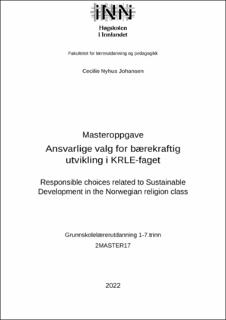| dc.contributor.advisor | | |
| dc.contributor.author | Cecilie Nyhus Johansen | |
| dc.date.accessioned | 2022-09-20T16:18:17Z | |
| dc.date.available | 2022-09-20T16:18:17Z | |
| dc.date.issued | 2022 | |
| dc.identifier | no.inn:inspera:109713146:31735983 | |
| dc.identifier.uri | https://hdl.handle.net/11250/3019785 | |
| dc.description.abstract | Denne masteroppgaven er en litteraturstudie innen bærekraftig utvikling som tverrfaglig tema i KRLE-faget.
Problemstillingen er «Hva vil det si å ta ansvarlige valg knyttet til bærekraftig utvikling i KRLE-faget for 1-4.trinn, når en legger til grunn innholdet i fagfornyelsen og læremidler?
Første del av studien presenterer relevant forskning knyttet til bærekraftig utvikling, som kan tolkes som ansvarlige valg. Det blir presentert hvorfor, og hvordan man skal utføre bærekraftundervisning. Andre del viser resultatet av analysen av fagfornyelsen og lærebøkene Store spørsmål 1-2 og Store spørsmål 3-4. Gjennom analysen oppstår to dilemmaer: danningens paradoks, og hvem som har ansvaret for å ta ansvarlige valg. Resultatet viser at elevene må bli dannet, og tilegne seg handlingskompetanse gjennom blant annet dybdelæring. Dette vil hjelpe elevene til å resonnere seg fram til hva ansvarlige valg er. Analysen av læreplanen viser at ansvarlige valg kan forstås som valg som tar vare på naturen og det biologiske mangfoldet, og som har balanse mellom de tre dimensjonene; miljø-, sosiale-, og økonomiske forhold. Analysen av lærebøkene avdekker bestemte handlinger som kan tolkes som ansvarlige valg for 1-4.trinn. Dette er gjenbruk, resirkulering, sortering, reparere, gi bort/videre. | |
| dc.description.abstract | Responsible choices related to Sustainable Development in the Norwegian religion class.
This master thesis is a literature study in sustainable development as an interdisciplinary topic in the Norwegian school subject “christianity, religion, life view, and ethics”.
The topic question is “what does it mean to make responsible choices related to sustainable development in the Norwegian religion class, based on the content of the subjects curriculum and textbooks?”
The first part of the study presents relevant research related to sustainability, which can be interpreted as responsible choices. It is presented why and how to teach about sustainability. The second part shows the result of the analysis of the curriculum and the textbooks … As the study developed , two dilemmas occurred; the paradox of “self formation/self education “, and who’s responsible to choose responsible choices. The result shows that the students need the “self formation/education” and need to develop a “competence of action” through “deep learning”. This will help the pupils to reason and understand what sustainable choices means. The analysis of the school curriculum show that responsible choices can be understood as choices that preserves nature and biodiversity, and that have a balanced between the three different dimension (environmental-, economical- and social). The analysis of the textbooks presented certain actions that can be perceived as responsible choices for pupils from 1-4th grade. This is reusing, recycling, sorting, repairing, and donating. | |
| dc.language | nob | |
| dc.publisher | Inland Norway University | |
| dc.title | Ansvarlige valg for bærekraftig utvikling i KRLE-faget | |
| dc.type | Master thesis | |
